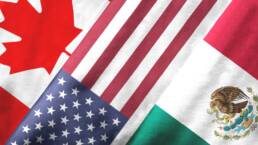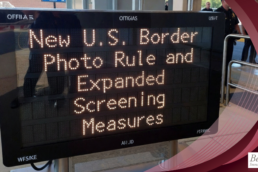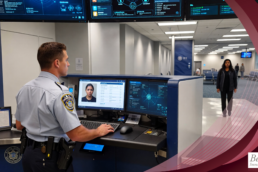On March 24, 2020, the Department of Homeland Security (DHS) published notice of the Secretary’s decisions to temporarily limit the travel of individuals from Canada and Mexico into the United states at land ports of entry along the United States-Canada and United States-Mexico border to “essential travel.” Given the outbreak and ongoing COVID-19 pandemic within the United States and globally, the Secretary determined the risk of continued transmission and spread of COVID-19 between the U.S. and Canada/Mexico posed a “specific threat to human life or national interests.”
The Secretary has since extended this temporarily limitation twice and it is now set to continue through June 21, 2020. While there have been recent reports of this limit being extended through the end of July, no official decision has been made yet.
Travel through the land ports of entry and ferry terminals along the U.S.-Canada and U.S.-Mexico border shall be limited to “essential travel,” which includes, but is not limited to:
- U.S. citizens and lawful permanent residents returning to the United States;
- Individuals traveling for medical purposes (e.g., to receive medical treatment in the United States);
- Individuals traveling to attend educational institutions;
- Individuals traveling to work in the United States (e.g., individuals working in the farming or agriculture industry who must travel between the United States and Canada in furtherance of such work);
- Individuals traveling for emergency response and public health purposes (e.g., government officials or emergency responders entering the United States to support federal, state, local, tribal, or territorial government efforts to respond to COVID-19 or other emergencies);
- Individuals engaged in lawful cross-border trade (e.g., truck drivers supporting the movement of cargo between the United States and Canada);
- Individuals engaged in official government travel or diplomatic travel;
- Members of the U.S. Armed Forces, and the spouses and children of members of the U.S. Armed Forces, returning to the United States; and
- Individuals engaged in military-related travel or operations.
The following travel does not fall within the definition of “essential travel”:
- Individuals traveling for tourism purposes (e.g., sightseeing, recreation, gambling, or attending cultural events).
At this time, this temporary travel restriction “does not apply to air, freight rail, or sea travel between the United States and Canada/Mexico, but does apply to passenger rail, passenger ferry travel, and pleasure boat travel between the United States and Canada/Mexico.” In other words, it is technically possible for you to fly commercially or privately into the United States from Canada or Mexico.
According to the Center for Disease Control and Prevention (CDC), you may be screened when you arrive in the United States. The CDC recommends after your arrival, take the following steps to protect yourself and others:
- Stay at home and avoid contact with others. Do not go to work or school for 14 days.
- Monitor your health for 14 days. Take your temperature with a thermometer two times a day and monitor for fever. Also watch for cough or trouble breathing.
- Keep your distance from others (at least 6 feet or 2 meters). This is referred to as “social distancing.”
Check the CDC’s Coronavirus Disease 2019 (COVID-19) Travel webpage to find the current travel health notice level for your international travel.
If you have questions on how COVID-19 may impact your immigration matters or travel to the United States, be sure to contact Berardi Immigration Law to schedule a consultation with one of our attorneys today!
Ready to have Berardi on your side?
Whether you’re a business looking to hire or a professional hoping to relocate, immigration law can be complicated. But you don’t have to do it alone. Put our experience to work for you.



